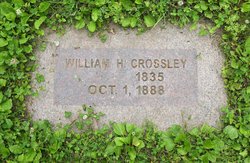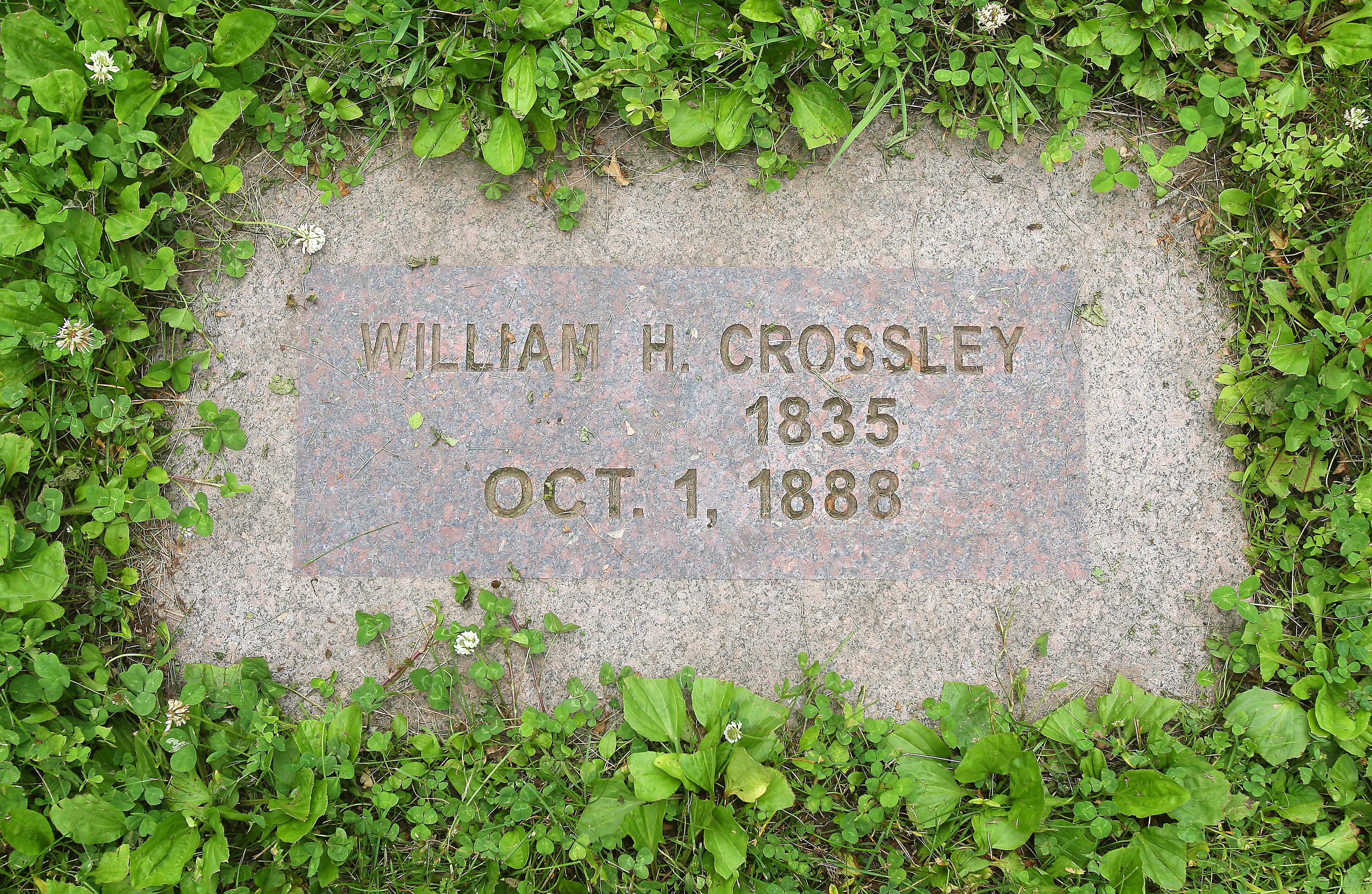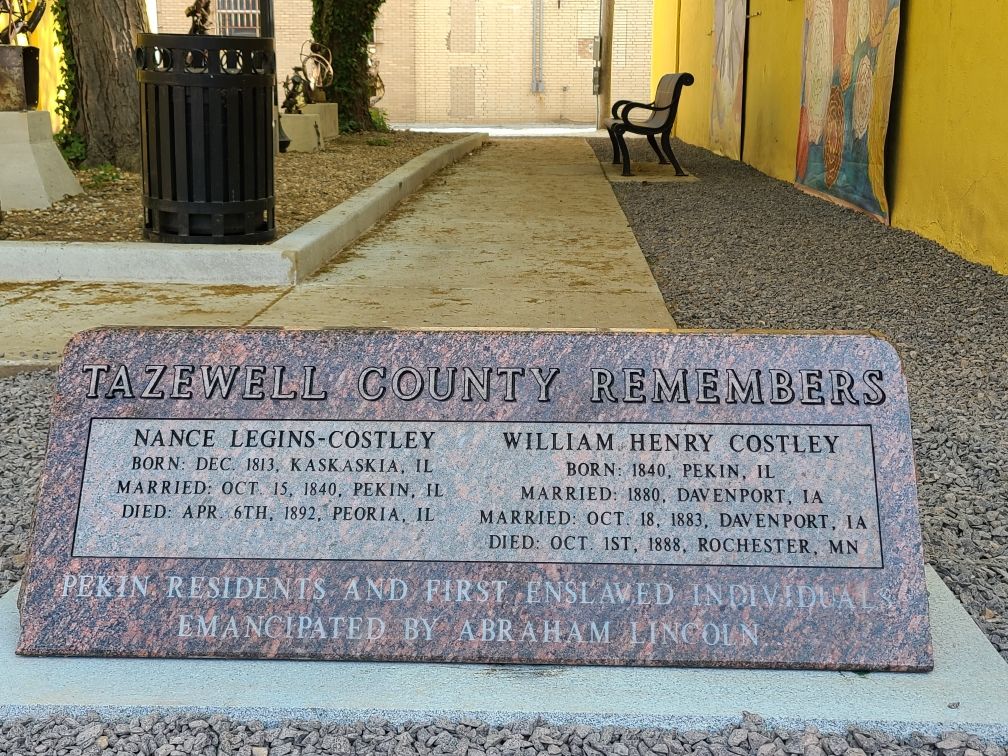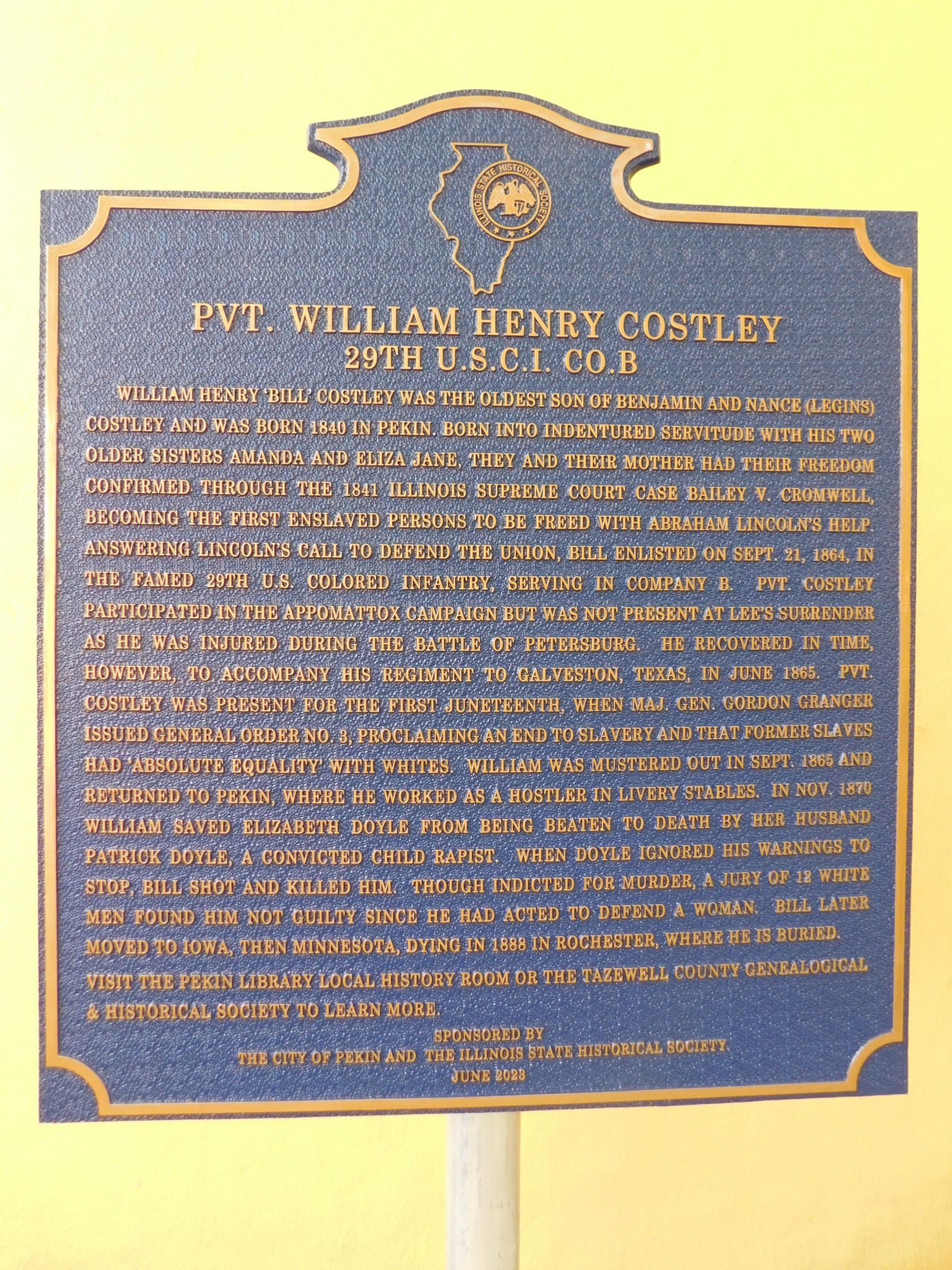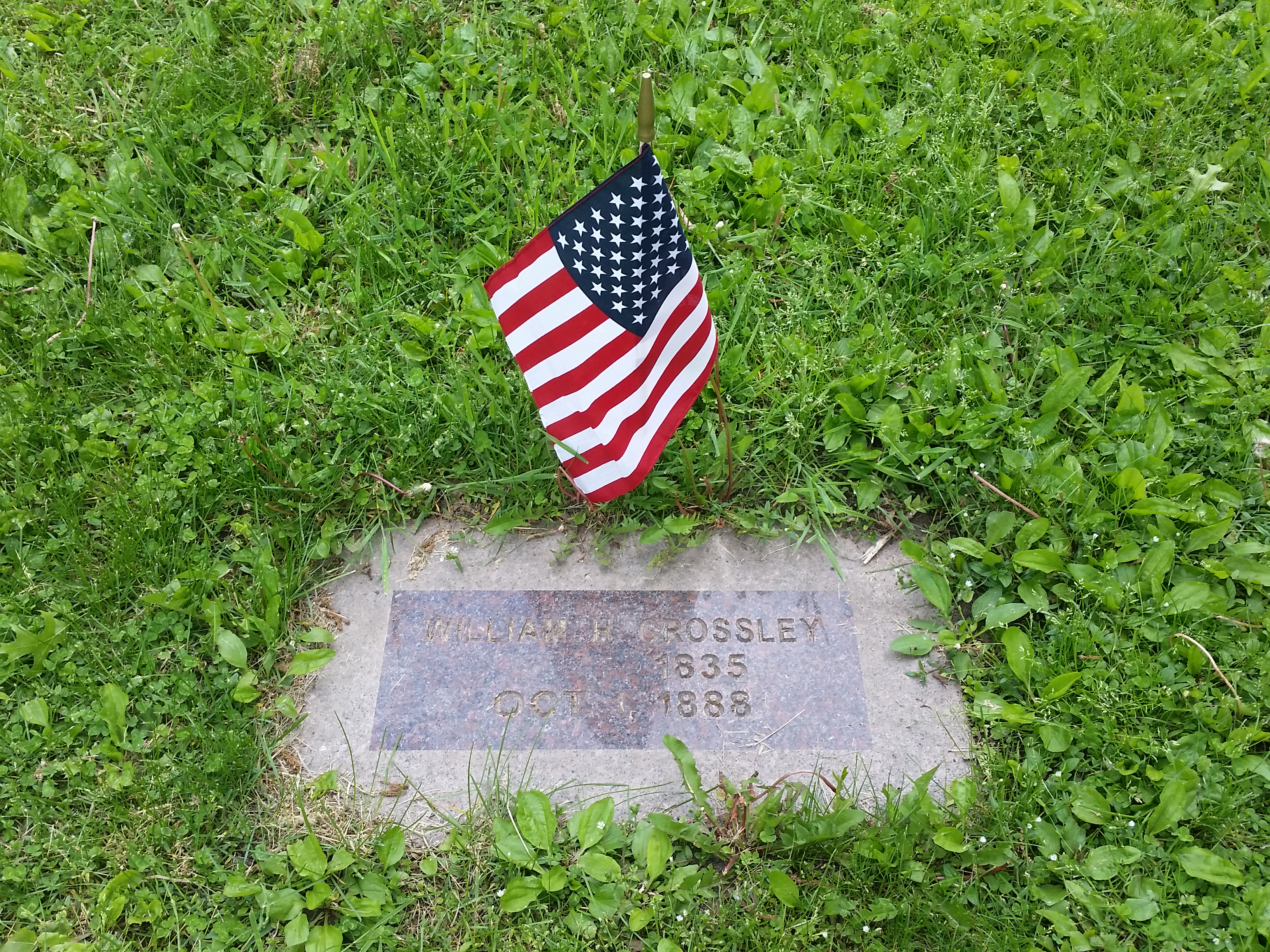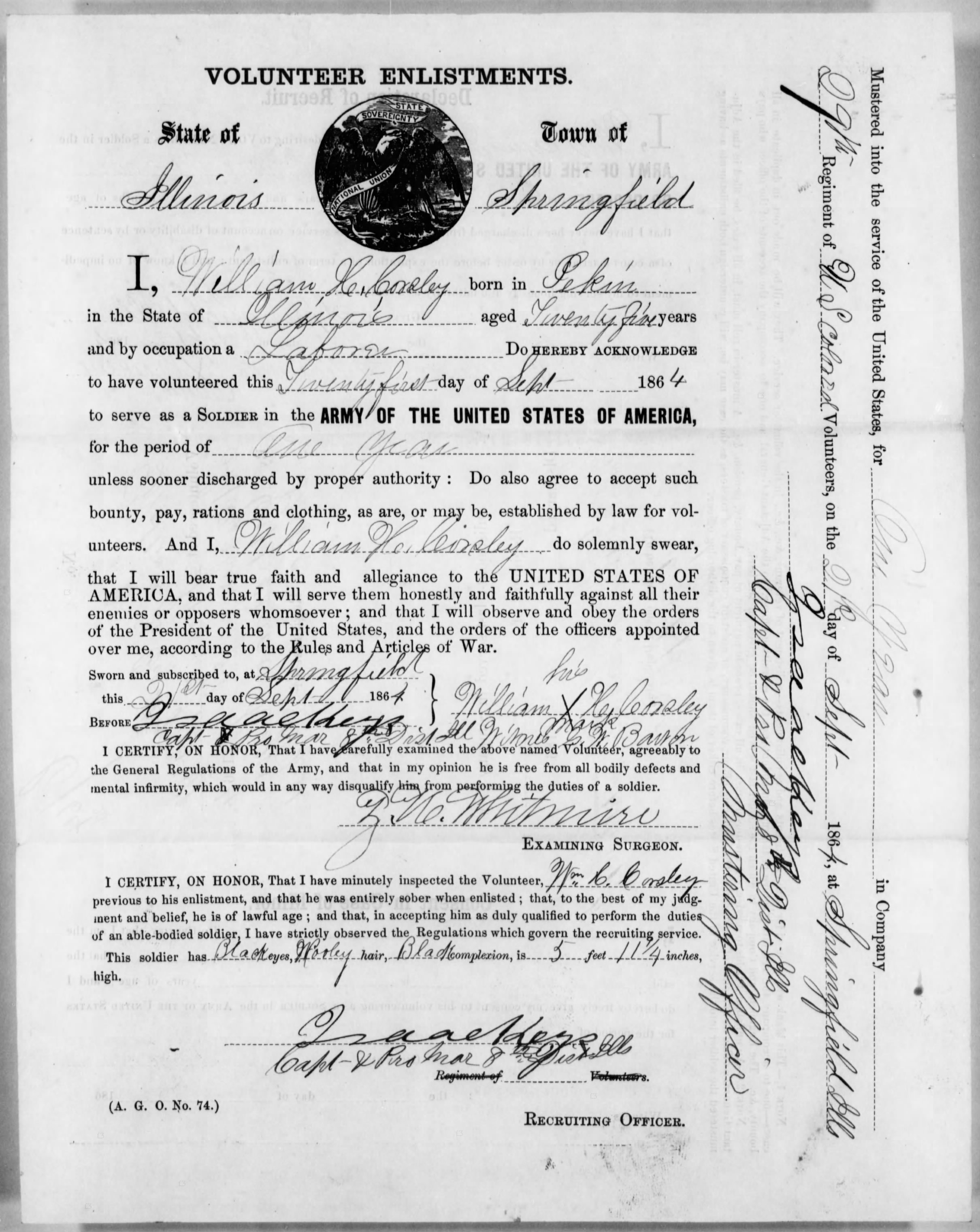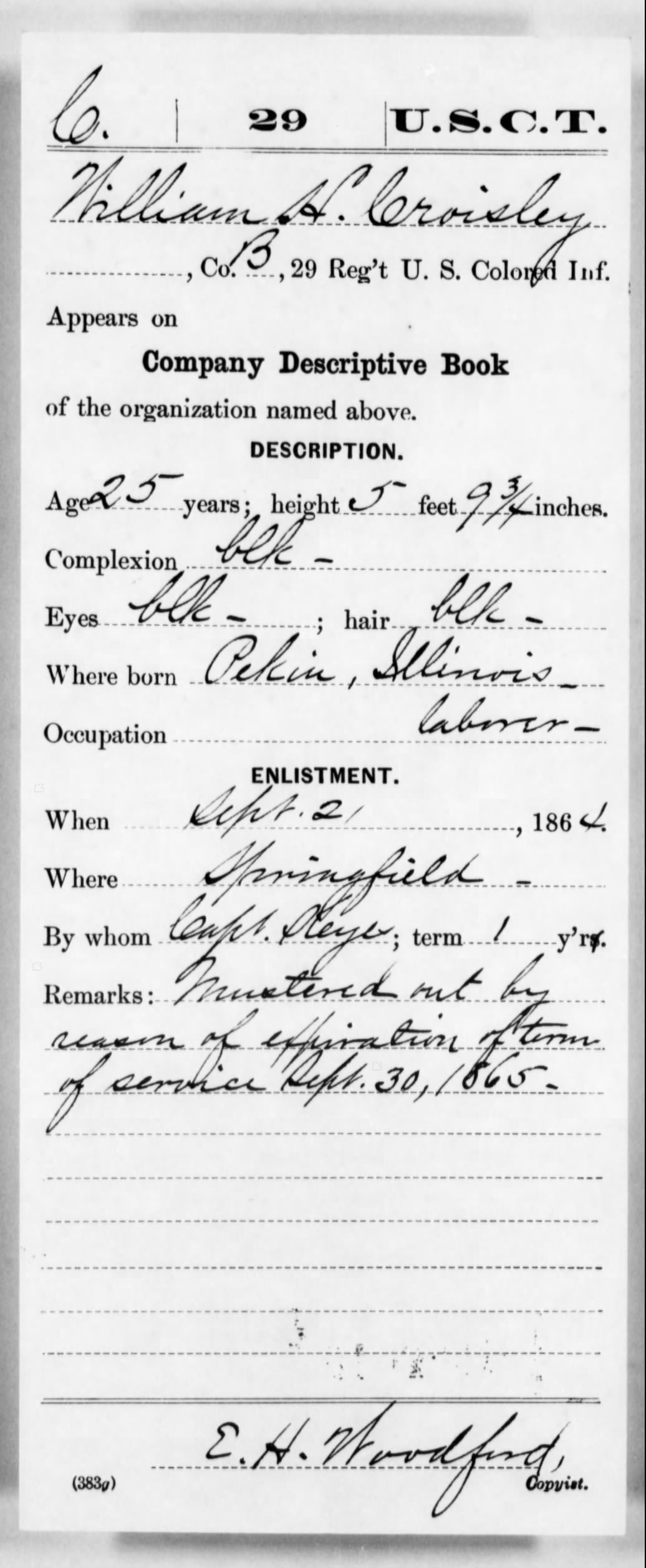The 1850 U.S. Census shows him as an 11-year-old African-American boy, third listed child of Benjamin and Nance Costley of Pekin, Illinois. Bill's mother has the distinction of being the first African-American freed through the work of Abraham Lincoln. This came about through the 1841 Illinois Supreme Court case of Bailey v. Cromwell. Nance served in the homes of several state politicians, and she clearly took in many of the legal and governmental discussions she overheard. She made the decision to sue for her freedom, arguing that she was not a slave, but an indentured servant who had fully served her contract. She fought all the way to the Illinois Supreme Court, where 32-year-old Abraham Lincoln argued her case and won. As a result of that case, Bill, who was not yet a year old at the time of the ruling, also was declared a a free citizen. Bill, who was never taught to read or write (hence the various spellings of his surname), later became a hostler [horse caretaker] in Pekin.
In 1864, Bill enlisted in the Illinois 29th Regiment of Colored Troops. Military records at the time spell his surname "Corsley." He suffered a shrapnel wound to his left shoulder in the Siege of Petersburg in the spring of 1865. Bill spent 5 weeks in the medical unit recovering from his injuries. It was during this medical stay that Bill learned of the assassination of President Lincoln. After recuperating and returning to his unit, he marched into Galveston, Texas with his regiment and was present there on 19 June 1865 when Major General Gordon Granger announced that all slaves were now free citizens. This is now celebrated as the first Juneteenth.
(Juneteenth is the oldest known celebration commemorating the ending of slavery in the United States. Dating back to 1865, it was on June 19th that the Union soldiers, led by Major General Gordon Granger, arrived in Galveston, Texas with news that the war had ended and that the enslaved were now free. From Juneteenth.com/history.html)
After the war, Bill returned to Pekin, where in 1870 he was put on trial for murder. Bill came upon a rather notorious white man in Pekin, Patrick Doyle, who was viciously beating his wife in the street. Doyle was known in the town for his drunkenness, violence, and previous prison term for rape. Bill ordered the man to stop, and when he did not, Bill pulled a gun and shot him dead. After a two-day trial, Bill was acquitted of murder, the all-male, all-white jury finding the homicide justifiable.
Bill later left Pekin and moved to Davenport, Iowa, where he worked as a hostler and horse trainer. There he met Mary Rebecca Webster, and together they had at least one daughter, Nancy Emma. Several years later in 1883, he married Margaret/Maggie Hartman. He and Maggie later divorced, and Bill moved to Minneapolis. There he was employed as a coachman. In May 1888, he was admitted as an "invalid" to Rochester State Hospital. The war injury, an old head injury from his youth, and a case of sunstroke a year earlier may all have played a part in his ill health. Bill died at the hospital five months later, on the night of October 1, 1888. The hospital ward notes say Bill "expired before he could be undressed." The hospital staff then recorded his death on the morning of October 2, 1888.
All of his hospital records and his death records are under the name Crossley. He was buried, marked only with his patient number stamped in a cement-filled coffee can, in the Rochester State Hospital Cemetery. His permanent headstone was placed in the Spring of 2014 by the Rochester State Hospital Recognition Group in partnership with Remembering with Dignity using the information available at the time (hospital/death records). Bill may not have known the exact date of his birth, and it is unclear how well he was able to communicate at the time of his hospitalization. The date of birth on his grave marker is based on hospital records, and may have been an estimate by hospital staff. U.S. Census records indicate that William was born circa 1840 (and not quite a year old when his mother won their freedom).
A great many thanks to Mr. Jared Olar, a writer from William's hometown of Pekin, Illinois, for the information about Mr. Crossley's amazing life.
The 1850 U.S. Census shows him as an 11-year-old African-American boy, third listed child of Benjamin and Nance Costley of Pekin, Illinois. Bill's mother has the distinction of being the first African-American freed through the work of Abraham Lincoln. This came about through the 1841 Illinois Supreme Court case of Bailey v. Cromwell. Nance served in the homes of several state politicians, and she clearly took in many of the legal and governmental discussions she overheard. She made the decision to sue for her freedom, arguing that she was not a slave, but an indentured servant who had fully served her contract. She fought all the way to the Illinois Supreme Court, where 32-year-old Abraham Lincoln argued her case and won. As a result of that case, Bill, who was not yet a year old at the time of the ruling, also was declared a a free citizen. Bill, who was never taught to read or write (hence the various spellings of his surname), later became a hostler [horse caretaker] in Pekin.
In 1864, Bill enlisted in the Illinois 29th Regiment of Colored Troops. Military records at the time spell his surname "Corsley." He suffered a shrapnel wound to his left shoulder in the Siege of Petersburg in the spring of 1865. Bill spent 5 weeks in the medical unit recovering from his injuries. It was during this medical stay that Bill learned of the assassination of President Lincoln. After recuperating and returning to his unit, he marched into Galveston, Texas with his regiment and was present there on 19 June 1865 when Major General Gordon Granger announced that all slaves were now free citizens. This is now celebrated as the first Juneteenth.
(Juneteenth is the oldest known celebration commemorating the ending of slavery in the United States. Dating back to 1865, it was on June 19th that the Union soldiers, led by Major General Gordon Granger, arrived in Galveston, Texas with news that the war had ended and that the enslaved were now free. From Juneteenth.com/history.html)
After the war, Bill returned to Pekin, where in 1870 he was put on trial for murder. Bill came upon a rather notorious white man in Pekin, Patrick Doyle, who was viciously beating his wife in the street. Doyle was known in the town for his drunkenness, violence, and previous prison term for rape. Bill ordered the man to stop, and when he did not, Bill pulled a gun and shot him dead. After a two-day trial, Bill was acquitted of murder, the all-male, all-white jury finding the homicide justifiable.
Bill later left Pekin and moved to Davenport, Iowa, where he worked as a hostler and horse trainer. There he met Mary Rebecca Webster, and together they had at least one daughter, Nancy Emma. Several years later in 1883, he married Margaret/Maggie Hartman. He and Maggie later divorced, and Bill moved to Minneapolis. There he was employed as a coachman. In May 1888, he was admitted as an "invalid" to Rochester State Hospital. The war injury, an old head injury from his youth, and a case of sunstroke a year earlier may all have played a part in his ill health. Bill died at the hospital five months later, on the night of October 1, 1888. The hospital ward notes say Bill "expired before he could be undressed." The hospital staff then recorded his death on the morning of October 2, 1888.
All of his hospital records and his death records are under the name Crossley. He was buried, marked only with his patient number stamped in a cement-filled coffee can, in the Rochester State Hospital Cemetery. His permanent headstone was placed in the Spring of 2014 by the Rochester State Hospital Recognition Group in partnership with Remembering with Dignity using the information available at the time (hospital/death records). Bill may not have known the exact date of his birth, and it is unclear how well he was able to communicate at the time of his hospitalization. The date of birth on his grave marker is based on hospital records, and may have been an estimate by hospital staff. U.S. Census records indicate that William was born circa 1840 (and not quite a year old when his mother won their freedom).
A great many thanks to Mr. Jared Olar, a writer from William's hometown of Pekin, Illinois, for the information about Mr. Crossley's amazing life.
Gravesite Details
Civil War Veteran
Family Members
Advertisement
Advertisement
